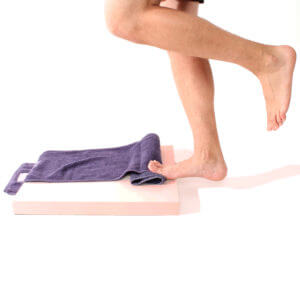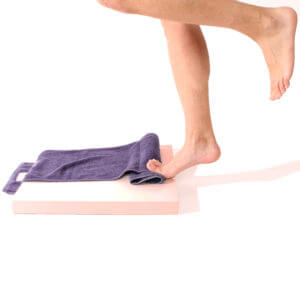The best exercise for plantar fasciitis

Plantar fasciitis can be one of the most difficult conditions for a practitioner and patient to manage. Treatment options range from biomechanical interventions, proximal and local strengthening, ice massage and stretching. While they can be effective, it is not uncommon that rehab fails and patients then look for other options such as extracorporeal shock wave therapy.
Rathleff et al (2014) produced a great study on the management of plantar fasciitis that was recently published in the Scandanavian Journal of Sports Medicine. The study compared the outcomes of two different approaches to plantar fasciitis management. The first group were given shoe inserts and underwent a stretching program while the second group was assigned to shoe inserts and high load strengthening exercise. The exercise was novel. It consisted of graded progressive strengthening via calf raises with the big toe extended. With the big toe extended, the plantar fascia is loaded more so than during standard calf raises.
The exercise is shown in the images below. It was completed every 2nd day and the progressions were made after the following timelines.
0-2 weeks – 3 sets of 12 repetitions
2-6 weeks – 4 sets of 10 repetitions
>6 weeks – 5 sets of 8 repetitions


Resistance was added via a backpack containing books and the exercise was conducted at a tempo of 3 seconds up, 2 seconds hold, 3 seconds down.
The results?
The high load strengthening group had a clinically relevant improvement and superior outcome to the stretching group at 3 months. However there was no difference between groups at 12 months. This could be attributed to the patient, once better, ceasing to do the exercises.
Why does this exercise help? Degenerative tendons have been shown to improve with high load strengthening. Whilst not a tendon, progressive high load tensile strengthening may also encourage collagen synthesis at the pathological plantar fascia enthesis. If you don’t already use this exercise we highly recommend putting it in your tool box when it comes to managing patients with plantar fasciitis. As this is a high quality exercise with proven benefits, we’ve also included it in the TrackActive Pro exercise database.
REFERENCES
Start your free 30 day trial now
Discover what TrackActive Pro can do for you and your patients with a no risk, 30 day, free trial.